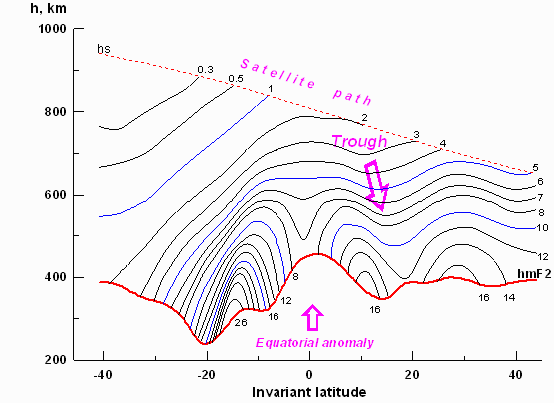|
|
 |
| |
|
|
| |
The main results of the research are:
- From the Cosmos-1809, Intercosmos-19 and Cosmos-900 satellite data the ring ionospheric trough, RIT, associated with the ring magnetospheric current and SAR-arcs was revealed and its characteristic were in detail investigated.
- From the Cosmos-900 in situ measurement data, two branches of the trough in the day-side winter ionosphere have been separated: the day-side main ionospheric trough which is observed in the region of "full shadow" and so called "Muldrew trough" which is mainly observed at sunlit longitudes in the auroral region.
- The mid-latitude trough associated with the plasmapause and low-latitude sub-trough in the light ions at the altitudes about 1000 km have been isolated from the ISS-b satellite. The occurrence probability dependence of the both troughs on season, local time, longitude and magnetic activity was investigated.
- A new type of the low-latitude trough in NmF2 have been revealed from the Intercosmos-19 topside sounding data which was observed mainly in December solstice in the equatorial anomaly Southern crest region (see Figure 3).
- The procedure for the both meridional and zonal wind calculations from the hmF2 longitudinal variations have been developed on the base of the Tikhonov's regularization method.
Figure 3. The example of Ne distribution in the topside ionosphere from the Intercosmos-19 data for the case of occurrence of the low-latitude trough at the equatorial anomaly Southern crest at night hours in December solstice at solar maximum. Figures at the curves are Ne values to be multiplied by 105 cm-3, hs is the satellite height.

|
|
|
|
 |





